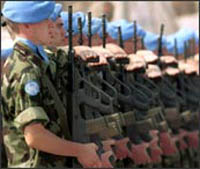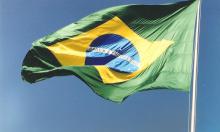U.N. Peacekeepers allowed to defend themselves but not fight
A new French report states that the U.N. peacekeepers will be allowed to use arms in self-defense and in urgent cases of Lebanese civilian protection, but they are not allowed to take active action against Hezbollah.

Le Monde newspaper said it had obtained a copy of a 21-page document laying out the provisional rules of engagement for the force, newly strengthened under a U.N. Security Council resolution.
The document, not yet approved, was stamped "U.N. Restricted," the newspaper said. The Foreign Ministry did not immediately respond to calls seeking confirmation.
While the United Nations is trying to secure more troops to boost the force from 2,000 troops to up to 15,000, many European countries have been unwilling to commit peacekeepers without establishing more explicit rules of engagement. EU officials in Brussels were to meet Wednesday to discuss troop contributions, AP reports.
The document cited in Le Monde did not apparently satisfy European countries, as it was distributed to all potential contributor countries Friday, according to the report.
Under the terms currently being discussed, the peacekeepers would operate mostly defensively, though they would be cleared to "use appropriate and credible force ... if necessary," Le Monde said, citing the document.
The force would be authorized to prevent hostile activities in a buffer zone in southern Lebanon; to counter anyone who tries to prevent peacekeepers from carrying out their mandate; and to "protect civilians in immediate threat of physical violence," Le Monde said, citing the document.
The newspaper said it obtained another working document that says the Lebanese army, working alongside the peacekeepers, must take control of the buffer zone and be responsible for disarming Hezbollah.
It quoted an unnamed U.N. official who said that peacekeepers could not actively seek weapons hidden by the militant group, but that they could seize any arms they found in normal patrols. The peacekeeping force, known as UNIFIL, will also set up checkpoints, the official said.
France - Lebanon's former colonial master - currently commands the existing 2,000-troop force. It has disappointed the U.N. and other countries by merely doubling its own contingent of 200 troops. Italian Prime Minister Romano Prodi has said that his country is willing to command the force, adding that he wants it to have a clearer mandate.
Subscribe to Pravda.Ru Telegram channel, Facebook, RSS!




